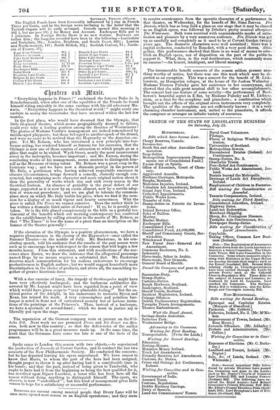t4totrrg Ruh 311Itzir.
"Everything happens in France !" exclaimed the famous Duke de la Rouchefoucauld, when after one of the squabbles of the Fronde he found himself riding amicably in the same carriage with his old adversary Ma- zarin. "Everything happens in the theatrical world !" might every one exclaim in seeing the vicissitudes that have occurred within the last few months.
In the first place, who would have dreamed that the Olympic, that little ill-placed theatre, which seems geographically doomed to failure, could ever take a leading position among the theatres of Westminster ? The glories of Madame Vestris's management are indeed remembered by middle-aged playgoers; but those belonged to another epoch of the drama, and were no more to be revived than the Heptarchy or the Assyrian em- pire. Yet Mr. Robson, who has introduced a new principle into bur- lesque acting, has rendered himself so famous for his successes, that the Olympic is now one of those centres of attraction to which people go as a place that ought to be visited. Wych Street, nearly the most inconvenient street in the metropolis, becomes important ; and Mr. Farren, during the concluding weeks of his management, seems anxious to distinguish him- self as the Mmcenas of rising talent Mr. Robson was a great coup in the histrionic way ; and we have now a dramatic protege in the person of Mr. Daly, a gentleman who, having achieved respectable successes in obscure circumstances, brings forward a comedy, clumsily enough con- structed, but containing more character and more original notion about it than the generality of works which rise and sink every season in the theatrical horizon. An absence of geniality is the great defect of our stage, supported as it is now by an exotic aliment, now by a servile adop- tion of worn-out precedents; and we are glad to tolerate the common- place story on which Mr. Daly builds his piece, when we find it the occa- sion for a display of so much vigour and hearty earnestness. Why the piece is called The Times we cannot conceive. Does the author think he has written a dramatic third satire of juvenal ? If so, he is greatly mis- taken. Or is the title placed conspicuously in the bills as a grateful tes- timonial of the benefits which our morning contemporary has conferred on the establishment by calling attention to the merits of Mr. Robson, so that "The Times" is less the name of a piece than an inscription on the banner of the theatre generally ?


































 Previous page
Previous page